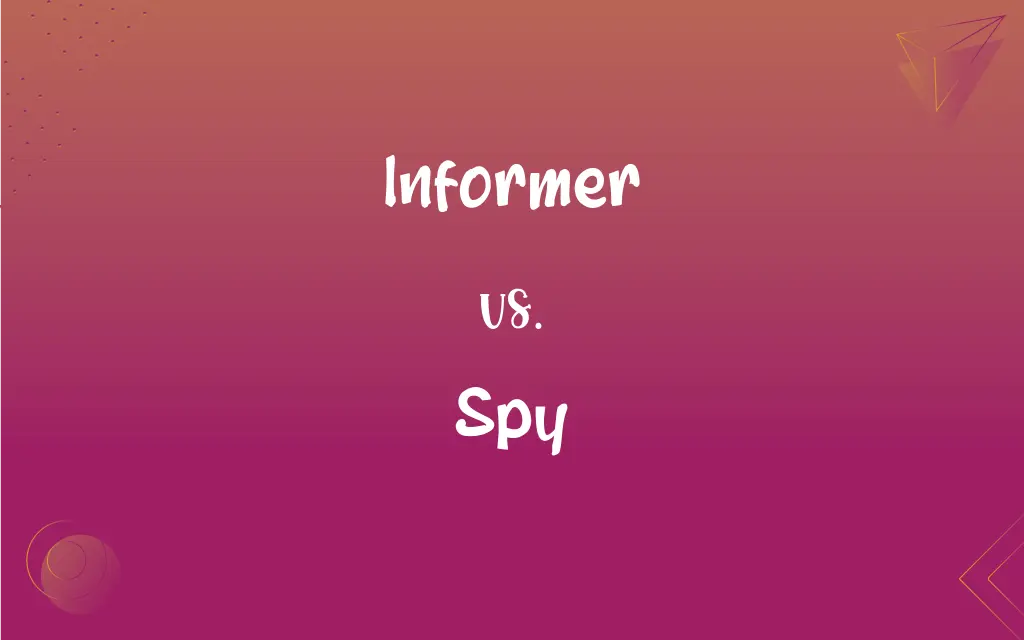Informer vs. Spy: What's the Difference?
Edited by Aimie Carlson || By Janet White || Updated on November 12, 2023
Informer is a person who provides information, often secretly, about someone to an authority. Spy is a person who secretly collects and reports information on the activities, movements, and plans of an enemy or competitor.

Key Differences
An informer is typically someone who provides information about others, often to an authority or law enforcement, sometimes for personal gain or safety. A spy, however, is usually employed or tasked by a government or organization to secretly gather information about an enemy or competitor.
Informers may simply relay information they come across, often as a one-time or occasional action. Spies engage in ongoing, covert operations to gather intelligence, often requiring training and special skills.
Informers are not necessarily affiliated with any intelligence organization and may act independently. Spies are usually aligned with a government or organization and are loyal to their cause or mission.
While both roles involve secrecy, spying is generally considered more dangerous, involving a higher level of subterfuge and risk. Informers may face danger but typically less than spies.
Informers may pass on information through less formal channels and might not use advanced techniques. Spies often use sophisticated methods, technologies, and strategies to acquire and transmit information.
ADVERTISEMENT
Comparison Chart
Primary Role
Providing information, often secretly
Secretly collecting intelligence
Affiliation
May not be aligned with an organization
Usually aligned with a government/organization
Risk Level
Varies, often lower than spying
High, involves significant danger
Method of Operation
Less formal, may not require training
Often requires training and sophisticated methods
Frequency of Action
Can be a one-time action or occasional
Involves ongoing, continuous operations
ADVERTISEMENT
Informer and Spy Definitions
Informer
A person who provides information to an opposing or controlling group.
The informer collaborated with the detectives.
Spy
A person skilled in espionage.
The spy transmitted confidential documents.
Informer
Someone who secretly gives information.
The informer tipped off the police about the plan.
Spy
A person employed to obtain secret information.
She was a spy for a foreign government.
Informer
A person who provides a tip or information to an authority.
An anonymous informer alerted the authorities.
Spy
Someone who operates in secret within an organization.
The spy posed as an employee.
Informer
Someone revealing wrongdoing within an organization.
The informer exposed corruption in the company.
Spy
An agent who works under cover.
As a spy, his identity was always concealed.
Informer
Informally, someone who tells on others.
He was known as the school's informer.
Spy
A person who secretly gathers information.
The spy infiltrated the enemy's ranks.
Informer
An informant, especially one who informs against others for compensation.
Spy
One who secretly collects information concerning the enemies of a government or group.
Informer
One who informs someone else about something.
Spy
One who secretly collects information for a business about one or more of its competitors.
Informer
A person who tells authorities about improper or illegal activity.
Spy
One who secretly keeps watch on another or others.
Informer
One who informs, animates, or inspires.
Spy
To watch or observe secretly
Was sent to spy out the enemy camp.
Informer
One who informs, animates, or inspires.
Nature, informer of the poet's art.
Informer
One who informs, or imparts knowledge or news.
Informer
One who informs a magistrate of violations of law; one who informs against another for violation of some law or penal statute.
Informer
One who reveals confidential information in return for money
FAQs
Is an informer always a traitor?
Not necessarily. Informers can act for various reasons, not always involving betrayal.
Can anyone be an informer?
Yes, anyone who provides information to an authority can be considered an informer.
Are spies always associated with governments?
Mostly, but spies can also work for private organizations or corporations.
Do spies have legal protection?
In their own countries, they might, but internationally, they often operate without legal protection.
What happens if a spy is caught?
If caught, a spy can face severe penalties, including imprisonment or execution, depending on the country.
Are spy activities always secret?
Yes, the nature of spying is inherently secretive and covert.
Do spies always work internationally?
Not always. Spies can operate both domestically and internationally.
Is being an informer illegal?
It depends on the context and nature of the information shared.
Are informers protected by law?
In some cases, especially whistleblowers, they can be protected under the law.
How do spies communicate?
Spies use various covert methods, including coded messages, secret meetings, and secure technology.
How are spies trained?
Spies are often trained in surveillance, intelligence gathering, and sometimes in combat.
Can informers work for personal gain?
Yes, some informers provide information for personal gain or protection.
Is it common for informers to face retaliation?
Yes, informers can face retaliation, especially in cases of exposing criminal activities or corruption.
Can informers remain anonymous?
Often, informers can choose to remain anonymous, especially when tipping off authorities.
What motivates someone to become a spy?
Motivations can include patriotism, ideology, financial gain, or coercion.
Do informers receive compensation?
Sometimes, especially in cases involving criminal investigations or intelligence gathering.
Do spies work alone?
They can work alone or as part of a larger network or agency.
Why do people become informers?
Reasons vary, including coercion, money, protection, or moral conviction.
Can a spy have a normal life?
It can be challenging due to the secretive and risky nature of the job.
How do authorities verify information from an informer?
Authorities often corroborate the information through investigation or additional sources.
About Author
Written by
Janet WhiteJanet White has been an esteemed writer and blogger for Difference Wiki. Holding a Master's degree in Science and Medical Journalism from the prestigious Boston University, she has consistently demonstrated her expertise and passion for her field. When she's not immersed in her work, Janet relishes her time exercising, delving into a good book, and cherishing moments with friends and family.
Edited by
Aimie CarlsonAimie Carlson, holding a master's degree in English literature, is a fervent English language enthusiast. She lends her writing talents to Difference Wiki, a prominent website that specializes in comparisons, offering readers insightful analyses that both captivate and inform.































































